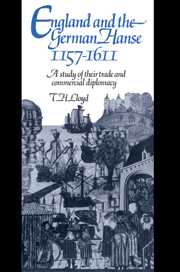Book contents
- Frontmatter
- Contents
- List of tables
- List of abbreviations
- Introduction
- 1 The winning of the Hanse franchises, 1157–1361
- 2 The English challenge, 1361–1399
- 3 Jockeying for advantage, 1400–1437
- 4 Trade, piracy, war, 1437–1474
- 5 Rivalry at Antwerp, 1474–1551
- 6 The loss of the Hanse franchises, 1551–1611
- Conclusion
- Appendix 1 Gildhall certificates
- Appendix 2 Hanse trade figures in the late fifteenth century
- Appendix 3 Elizabethan cloth exports
- Appendix 4a English cloth dyed at Hamburg, 1535–1612
- Appendix 4b English cloth forwarded from Hamburg without local handiwork 1568–1605
- Bibliography
- Index
4 - Trade, piracy, war, 1437–1474
Published online by Cambridge University Press: 18 December 2009
- Frontmatter
- Contents
- List of tables
- List of abbreviations
- Introduction
- 1 The winning of the Hanse franchises, 1157–1361
- 2 The English challenge, 1361–1399
- 3 Jockeying for advantage, 1400–1437
- 4 Trade, piracy, war, 1437–1474
- 5 Rivalry at Antwerp, 1474–1551
- 6 The loss of the Hanse franchises, 1551–1611
- Conclusion
- Appendix 1 Gildhall certificates
- Appendix 2 Hanse trade figures in the late fifteenth century
- Appendix 3 Elizabethan cloth exports
- Appendix 4a English cloth dyed at Hamburg, 1535–1612
- Appendix 4b English cloth forwarded from Hamburg without local handiwork 1568–1605
- Bibliography
- Index
Summary
Henry Vorrath remained in England until the end of July 1437, several weeks after the departure of his fellow ambassadors. On his way home he was imprisoned in the bishopric of Mlinster as a hostage for the debts of some Prussian merchants. Efforts to secure his release were protracted and not until March 1438 did he reach Danzig, where he received a cool reception. In April, after hearing his own account of his mission, the Prussian diet decided to defer ratification of the treaty, despite its acceptance by the Hanse diet the previous August. In the interim Prussian subjects were allowed to trade with England. At the next diet in mid-May Vorrath appealed to the Grand Master for protection against his fellow citizens, who accused him of having exceeded his powers. They also urged that Prussia should disavow the treaty, being spurred on by demands of newly returned English merchants. For the most part the latter were merely asking for things which they had formerly enjoyed, though not without opposition from Danzig. Nevertheless, in the past the Grand Master and the Prussian diet had often supported English claims. Unfortunately, the merchants also raised the thorny question of taxation. They objected to paying the Danzig Pfahlgeld, on the grounds that it had been instituted only thirty-six or thirty-seven years previously. They appear to have been ignorant of the origin of Pfundzoll, levied by the Teutonic Order, but nevertheless claimed exemption.
- Type
- Chapter
- Information
- England and the German Hanse, 1157–1611A Study of their Trade and Commercial Diplomacy, pp. 173 - 234Publisher: Cambridge University PressPrint publication year: 1991



